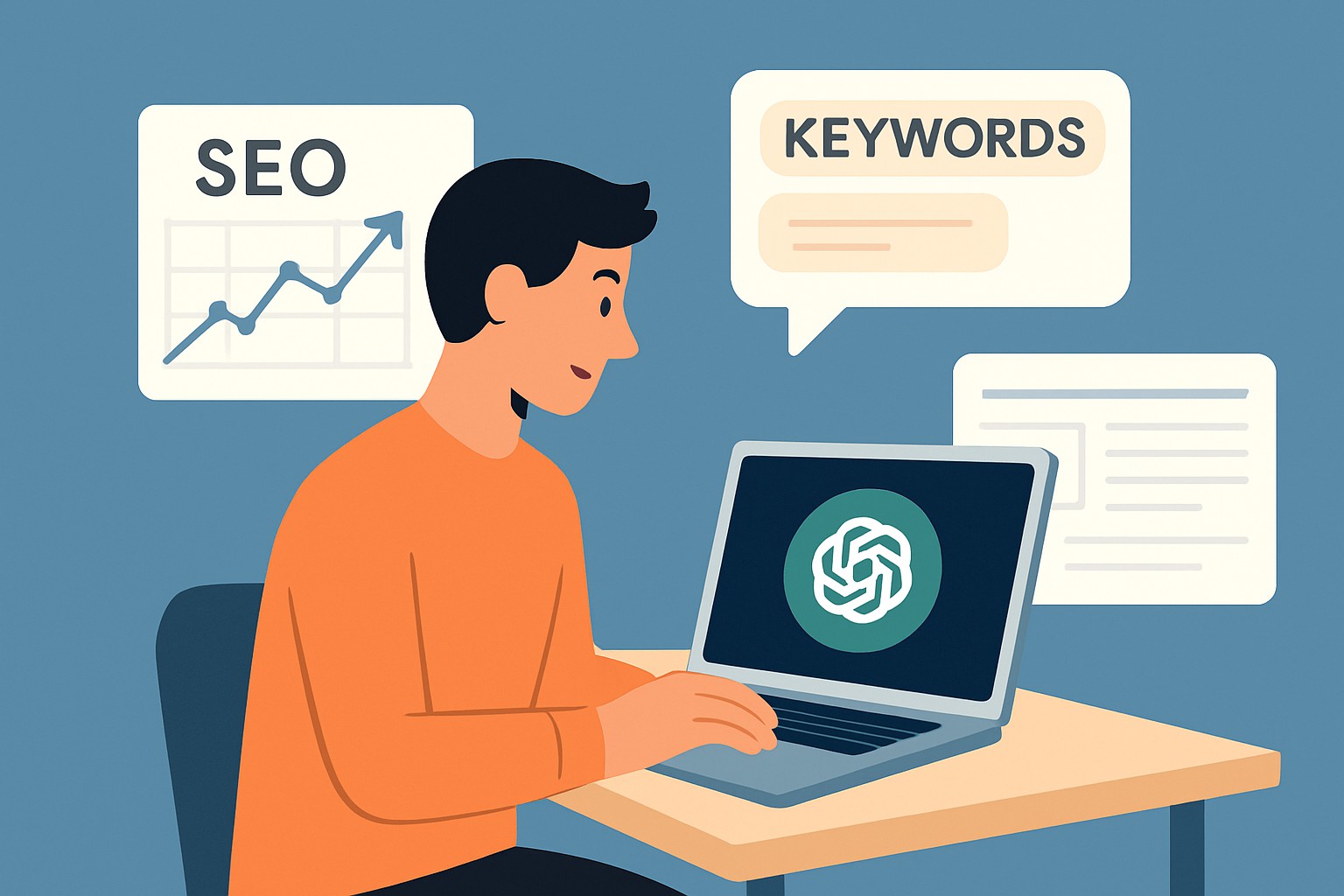How to use ChatGPT for SEO to improve content?


SEO keeps throwing curveballs. Tools like ChatGPT have become a trusty sidekick for content creators and marketers. It helps whip up, fine-tune and polish content that truly vibes with both audiences and search engines.
Getting to Know ChatGPT and Where It Really Fits into SEO
ChatGPT is a sophisticated language model crafted by OpenAI that understands and generates natural, human-like text by tapping into a vast pool of data. Thanks to its use of natural language processing (NLP), it helps users create meaningful, context-aware content that fits well with traditional SEO strategies. Whether brainstorming fresh content ideas, slipping keywords in without making them stand out, or crafting engaging conversational text, ChatGPT usually boosts content quality and relevance.
Building a Rock-Solid SEO Foundation Before You Dive Into ChatGPT
It’s a good idea to lay down a solid SEO foundation first.
- Roll up your sleeves and dive into detailed keyword research using tools like Moz or Mangools to uncover golden keywords that make a difference.
- Take a good look at your competitors' content to get a feel for their topics and keywords and maybe spot where they’re dropping the ball.
- Get to know your target audience deeply, focusing on what they’re genuinely searching for and what makes them tick.
- Set clear content goals, whether to inform, engage, or nudge conversions up a notch.
- Give your existing content a thorough once-over to spot what’s outdated or could use polishing, or what might be better off replaced.
Step-by-Step Guide to Crafting SEO-Optimized Content Using ChatGPT (Yes, It’s as Easy as It Sounds)
Start off by crafting clear detailed prompts that spell out your SEO keyword focus, target audience and the style of content you are aiming for.
Let ChatGPT help you brainstorm various topic ideas around your main keyword so you can uncover fresh angles that really grab attention.
Put together content outlines to keep your article running smooth and make sure no important subtopics slip through.
Have ChatGPT whip up an initial draft that weaves in your keywords naturally without going overboard and sounding like a broken record.
Get ChatGPT to suggest SEO-friendly meta titles and descriptions that tick all the right boxes.
Take a close look at the generated content, sprinkle in your insights and double-check the facts.
Use ChatGPT to flesh out specific sections or craft FAQs that add depth and keep readers hooked.
Wrap things up with SEO-friendly formatting like headers, bullet points and internal links because presentation counts as much as content.
Each step is designed to squeeze the best juice out of ChatGPT while making sure your content stays aligned with SEO guidelines. Detailed prompts usually lead to more relevant results and having a clear outline helps keep everything organized and on point. Using keywords naturally is key because nobody likes forced phrasing. It also keeps penalties at bay and makes the text easy to read. Editing ensures your voice stays consistent and the facts stay spot on.

Workspace overview showing the process of creating SEO content using ChatGPT alongside SEO tools
Effective Ways to Optimize ChatGPT-Generated Content for SEO
If you have ever wrestled with making AI content sing to the tune of SEO, you are not alone—it's a bit of an art and a science rolled into one. Let us dive into some tried-and-true methods that, in my experience, help ChatGPT-generated content not just pass muster but truly shine in search rankings. From sprinkling in natural keywords to fine-tuning readability, these tips are your toolkit for turning raw AI output into SEO gold.
- Keep keyword density at a natural level so it doesn’t sound like you’re trying too hard or trigger SEO penalties.
- Always double-check AI-generated content for originality by running plagiarism scans and add unique details to give it a human touch.
- Make thoughtful human edits to improve tone, clarity and accuracy. These small tweaks can help draw readers in and keep them engaged.
- Organize your content with clear headings, bite-sized paragraphs and bullet points to make it easy to read.
- Sprinkle relevant internal links to your own content and trusted external sources because it’s a great way to build credibility and show you know your stuff.
- Keep your ChatGPT-generated content fresh by updating it regularly so you stay ahead of the competition.
- Use schema markup to enhance how your pages appear in search results and give your SEO efforts a helpful boost.
Polishing AI-assisted content with SEO best practices in mind really pays off when it comes to how both search engines and readers react. It’s all about striking the right balance—steering clear of pitfalls like keyword stuffing or thin content—while quietly boosting the kind of credibility and trust that search engines just can’t resist.
Common Challenges You Might Run Into When Using ChatGPT for SEO and How to Navigate Them Like a Pro
ChatGPT is undeniably a powerful tool. However, users sometimes run into quirks like AI content getting flagged by search engines, odd slip-ups in accuracy, repetitive phrasing, and occasional struggles to maintain a unique brand voice.
- Always double-check ChatGPT's responses against trusted sources and give those outdated details a quick refresh because you would be surprised how fast things can change.
- Make manual tweaks to capture your brand’s distinct voice since it really helps the content come alive and feel more authentic.
- Tailor your prompts with clear, specific instructions to avoid that annoying repetition and encourage a wider variety of phrasing.
- Mix AI-generated drafts with your own writing magic to create a smooth, natural flow that reads like a conversation instead of a robot.
- Keep an eye on analytics to see how your content is performing and update it regularly to make sure it stays fresh and spot-on accurate.
Handy Tools and Resources to Give Your SEO Work with ChatGPT a Real Boost
- Moz Pro packs a punch with robust keyword research and thorough site audits. It also offers reliable rank tracking, making it a solid go-to for anyone diving deep into SEO and content analysis.
- Mangools keeps things simple and user-friendly with straightforward keyword research and backlink analysis tools that click well with beginners and intermediate users.
- Plagiarism checkers are your trusty sidekick for making sure your ChatGPT-generated content stays original because nobody wants to risk SEO penalties.
- SEO auditing tools are like having a digital detective on your team. They spot technical hiccups and highlight opportunities to boost your website’s game.
- Analytics platforms are key for monitoring how your content performs. They track user engagement and help you understand conversion metrics as they evolve over time.
How ChatGPT Might Just Shake Up Your SEO Results
If you want to get a real sense of how content whipped up by ChatGPT is holding up, it pays to keep a close eye on key SEO metrics like organic traffic and keyword rankings, bounce rates and conversion rates.
| Metric | Description | Tools to Measure | Ideal Range / Goal |
|---|---|---|---|
| Organic Traffic | The number of visitors swinging by from search engines | Google Analytics, Moz | Steady, consistent growth month after month |
| Keyword Ranking | Where your targeted keywords land on search engine leaderboards | Moz Rank Tracker, Mangools | Shoot for a sweet spot in the top 3 for main terms |
| Bounce Rate | The percentage of visitors who leave after just one page | Google Analytics | Usually better kept below 50% — less bounce, more stick |
| Conversion Rate | The portion of visitors who go ahead and complete key actions | Google Analytics, CRM tools | Depends on your goals, but ideally improving over time |
| Time on Page | Average minutes visitors spend really soaking in your content | Google Analytics | The longer, the better — shows genuine interest and engagement |
Frequently Asked Questions
Can ChatGPT replace human writers for SEO content?
ChatGPT is a handy tool for creating and fine-tuning content but it’s not ready to replace human writers yet. It’s great at brainstorming ideas, outlining, and drafting articles. However, you’ll still need a human touch for fact-checking, adding unique insights and keeping your brand’s voice authentic and relatable. Teaming AI’s speed with human creativity and a keen eye usually produces better SEO results.
How do I avoid AI-generated content penalties from search engines?
Search engines love original, high-quality content—nothing cookie-cutter or robotic. To avoid penalties, tweak ChatGPT’s output so keywords fit naturally, add your own spin and double-check facts. Running plagiarism checks and avoiding tired generic phrases helps a lot. Keeping your content fresh and focused on what your audience wants tends to win with algorithms, no matter who or what created it.
What’s the best way to prompt ChatGPT for SEO-friendly content?
Being specific with your prompts pays off. Include keywords, details about your audience, tone and structure—for example, 'Write a 500-word blog intro about ChatGPT for SEO aimed at small businesses in a conversational tone.' Adding context like competitor info or content gaps improves results. Taking a few iterative steps to refine prompts often gets better answers than one big ask.
How can I use ChatGPT to improve existing content for SEO?
You can feed ChatGPT snippets of your content and ask for ways to polish it, such as adding keywords naturally, boosting readability or fleshing out FAQs. It’s also useful for refreshing outdated bits, suggesting internal links and crafting meta descriptions that pop. Just be sure to double-check everything since aligning tweaks with your goals is key.
Are there free alternatives to ChatGPT for SEO content creation?
Absolutely, there are some decent free options! Google’s Bard, Claude AI and Bing Chat offer similar features to keep things going. For keyword research, tools like Ubersuggest or AnswerThePublic can be handy. That said, if you’re serious about SEO, investing in paid options like ChatGPT Plus often pays off with better quality and extra features.
How long does it take to see SEO results from ChatGPT-generated content?
SEO results vary since they depend on competition, domain authority and content quality. Content optimized with ChatGPT might rank within weeks for less competitive keywords. Tougher terms often take months to improve. Monitoring metrics like organic traffic and rankings and tweaking your approach based on what works usually does the trick.
Unlock Digital Marketing Success with Moz
Struggling to optimize your online presence? Moz is the ultimate Internet Marketing solution, empowering businesses with powerful SEO tools, insightful analytics, and expert guidance. Elevate your digital strategies and outshine the competition.
- Boost organic traffic with data-driven SEO tactics
- Enhance content marketing with expert recommendations
- Gain a competitive edge with comprehensive link analysis








